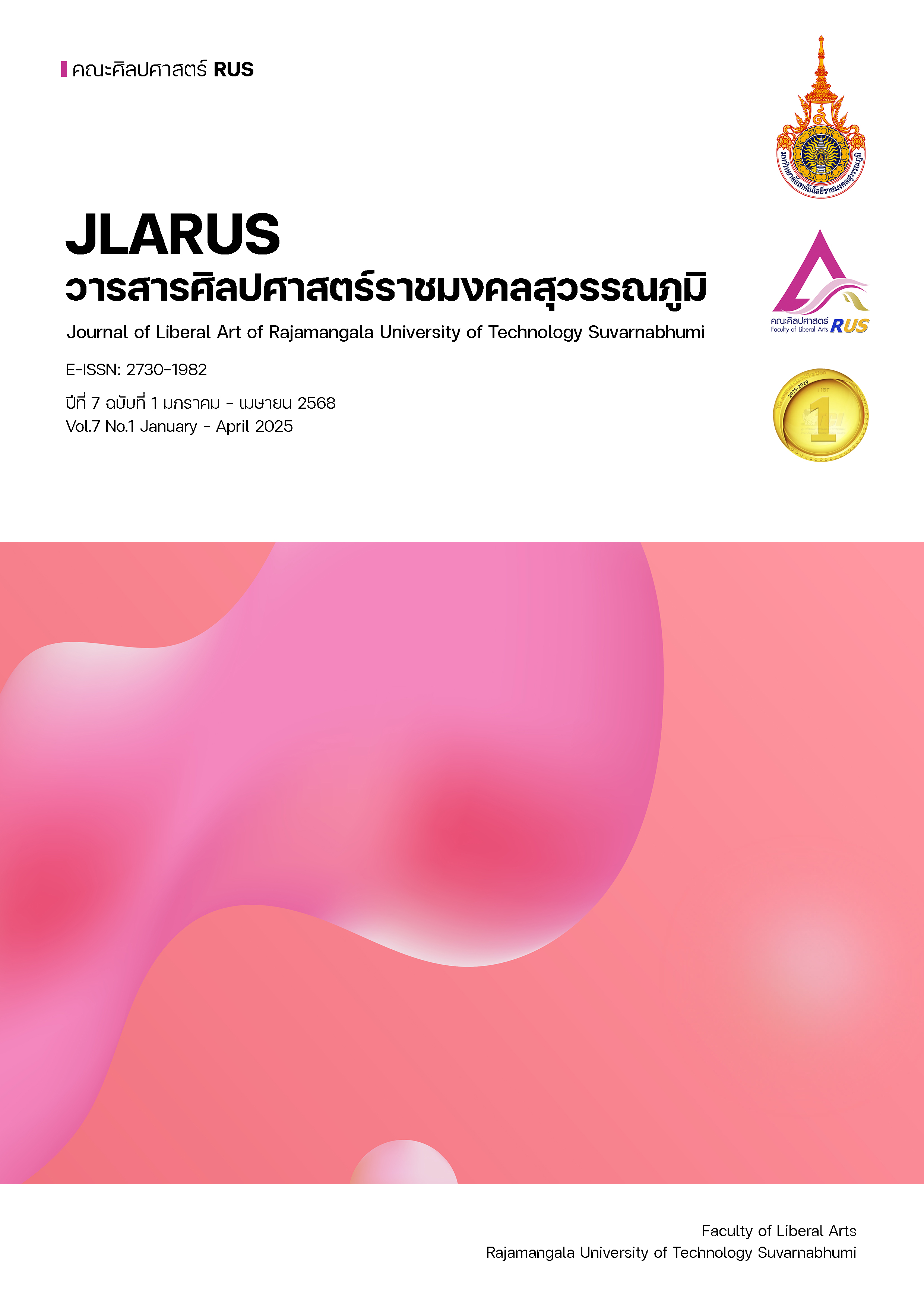DIGITAL LEADERSHIP AND ESG MANAGEMENT AFFECTING ORGANIZATIONAL PERFORMANCE OF FOOD INDUSTRY IN SAMUT SAKHON
Main Article Content
Abstract
The objectives of this research were 1) to investigate the correlation among digital leadership, ESG management and organizational performance of food industry in Samut Sakhon, 2) to investigate the effects of digital leadership and ESG management on organizational performance of food industry in Samut Sakhon. The research was quantitative. The questionnaire was used as the tool for data collection from 181 executives from the food industry in Samut Sakhon. Data analysis employed descriptive statistics, including the mean and standard deviation, as well as inferential statistics such as Pearson correlation analysis and multiple regression analysis. The research results were found as follows;
1) The mean of digital leadership was at a high level (x̅ = 3.81). The mean of ESG management in the environmental aspect was at a high level (x̅ = 3.83). The mean of ESG management in the social aspect was at a high level (x̅ = 3.81). The mean of ESG management in the governance aspect was at a high level (x̅ = 3.91). The mean of organizational performance was at a high level (x̅ = 3.97).
2) Digital leadership had a significant positive correlation with organizational performance of food industry in Samut Sakhon at 0.01 level. ESG management had a significant positive correlation with organizational performance at 0.01 level as well. The correlation coefficient for digital leadership, ESG management in the social, governance and environmental aspects were 0.580, 0.565, 0.542 and 0.500 respectively.
3) Digital leadership had a positive effect on organizational performance (beta = 0.317) and ESG management in the social aspect had a positive effect on organizational performance of food industry in Samut Sakhon (beta = 0.261).
Article Details

This work is licensed under a Creative Commons Attribution-NonCommercial-NoDerivatives 4.0 International License.
References
กฤตชน วงศ์รัตน์ และธิดารัตน์ ปิ่นทอง. (2563). ความสัมพันธ์ระหว่างความรับผิดชอบต่อสังคมของธุรกิจกับการดำเนินงานของโรงงานอุตสาหกรรมอาหารจังหวัดเพชรบุรี. วารสารวิชาการ มหาวิทยาลัยราชภัฏเพชรบุรี, 10(1), 98-108. https://journal.pbru.ac.th/onlinearticles.php?cid=13
กัลยา วานิชย์บัญชา. (2550). การวิเคราะห์สถิติขั้นสูงด้วย SPSS for Windows. จุฬาลงกรณ์มหาวิทยาลัย.
ขวัญยิหวา ไชยมาลา และอิสราภรณ์ ทนุผล. (2560). ความสัมพันธ์ระหว่างการทําความรับผิดชอบต่อสังคมกับผลการดําเนินงานขององค์กร. วารสารสหศาสตร์ศรีปทุม ชลบุรี, 3(2), 1-9. https://www.chonburi.spu.ac.th/interdiscip/filepdf/A851530174562.pdf
จีรศักดิ์ คำสุรีย์ ดุจเดือน ฮามวงศ์ และอลิตา ยิ้มพยัคฆ์. (2566). รายงานวิจัยแนวทางการปรับตัวของอุตสาหกรรมอาหารไทยเพื่อรับมือระเบียบกฎเกณฑ์ด้านความยั่งยืน (ESG). สำนักงานเศรษฐกิจอุตสาหกรรม. https://www.oie.go.th/assets/portals/1/files/study_report/Thai_food_ESG.pdf
ศูนย์อัจฉริยะเพื่ออุตสาหกรรมอาหาร. (2567, มิถุนายน). อุตสาหกรรมอาหารไทยไตรมาสที่ 1 และแนวโน้มไตรมาสที่ 2 ปี 2567. สถาบันอาหาร. https://fic.nfi.or.th/foodindustry_quarterlySituation-detail.php?smid=2901
สำนักงานอุตสาหกรรมจังหวัดสมุทรสาคร. (2565). รายงานความเคลื่อนไหวการลงทุนอุตสาหกรรมของจังหวัดสมุทรสาคร ประจำเดือนมีนาคม 2565. https://samutsakhon.industry.go.th /th/cms-of-119
สุรินทร์ เจนพิทยา. (2566, 22 ธันวาคม). ส่องจุดแข็ง สมุทรสาคร ทำไมขึ้นแท่น ฮับอาหารทะเลแปรรูปใหญ่สุดของไทย. กรุงเทพธุรกิจ. https://www.bangkokbiznews.com/business /1104939
Aaker, D. A., Kumar, V., & Day, G. S. (2007). Marketing research. John Wiley & Son.
Alareeni, B. A. & Hamdan, A. (2020). ESG impact on performance of us S&P 500-listed firms. Corporate Governance, 20(7), 1409-1428. https://doi.org/10.1108/CG-06-2020-0258
De Souza Barbosa, A., Da Silva, M. C. B. C., Da Silva, L. B., Morioka, S. N. & De Souza, V. F. (2023). Integration of environmental, social, and governance (ESG) criteria: their impacts on corporate sustainability performance. Humanities and Social Sciences Communications, 10, 410. https://doi.org/10.1057/s41599-023-01919-0
Hair, J. F., Black, W. C., Babin, B. J., Anderson, R. E., & Tatham, R. L. (2006). Multivariate Data Analysis (6th ed.). Pearson Prentice Hall.
Khaw, T. Y., Teoh, A. P., Khalid, S. N. A. & Letchmunan, S. (2022). The impact of digital leadership on sustainable performance: A systematic literature review. Journal of Management Development, 41(9/10), 514-534. https://doi.org/10.1108/JMD-03-2022-0070
Kordab, M., Raudeliuniene, J. & Meidute-Kavaliauskiene, I. (2020). Mediating role of knowledge management in the relationship between organizational learning and sustainable organizational performance. Sustainability, 12(23), 10061. https://doi.org/10.3390/su122310061
Lee, C. F., Lee, J. C., & Lee, A. C. (2000). Statistics for business and financial economics. World Scientific.
Mollah, M. A., Choi, J. H., Hwang, S. J. & Shin, J. K. (2023). Exploring a pathway to sustainable organizational performance of south korea in the digital age: the effect of digital leadership on it capabilities and organizational learning. Sustainability, 15(10), 7875. https://doi.org/10.3390/su15107875
Munsamy, M., Dhanpat, N. & Barkhuizen, E. N. (2023). The development and validation of a digital leadership competency scale. Acta Commercii, 23(1), 1057. https://doi.org/10.4102/ac.v23i1.1057
Niu, S., Park, B. I. & Jung, J. S. (2022). The effects of digital leadership and ESG management on organizational innovation and sustainability. Sustainability, 14(23), 15639. https://doi.org/10.3390/su142315639
Park, S. R., & Jang, J. Y. (2021). The impact of ESG management on investment decision: Institutional investors’ perceptions of country-specific ESG criteria. International Journal of Financial Studies, 9(3), 48. https://doi.org/10.3390/ijfs9030048
Peng, B. (2022). Digital leadership: State governance in the era of digital technology. Cultures of Science, 5(4), 210-225. https://doi.org/10.1177/2096608321989835
Saddique, F., Ramzan, B., Sanyal, S., & Alamari, J. (2023). Role of digital leadership towards sustainable business performance: A parallel mediation model. Journal of Infrastructure, Policy and Development, 7(3), 2023. https://doi.org/ 10.24294/jipd.v7i3.2416
Sagbas, M., Oktaysoy, O., Topcuoglu, E., Kaygin, E. & Erdogan, F. A. (2023). The mediating role of innovative behavior on the effect of digital leadership on intrapreneurship intention and job performance. Behavioral Sciences, 13(10), 874. https://doi.org/10.3390/bs13100874
Shin, J., Mollah, M. A. & Choi, J. (2023). Sustainability and organizational performance in South Korea: The effect of digital leadership on digital culture and employees’ digital capabilities. Sustainability, 15(3), 2027. https://doi.org/10.3390/su15032027
Tulungen, E. E., Tewal, B. & Pandowo, M. (2022). The role of digital leadership mediated by digital skill in improving organizational performance. Journal of Accounting Research, Organization and Economics, 5(2), 156-171. https://doi.org/10.24815/jaroe.v5i2.26182
Winanti, M. B. (2023). How is the role of digital leadership and knowledge sharing on performance? An empirical study on SMEs in bandung west java. International Journal of Artificial Intelligence Research, 6(1.1). https://doi.org/10.29099/ijair.v6i1.296
Yamane, T. (1973). Statistics: An introductory analysis (3rd ed.). Harper and Row Publisher.
Yang, O. S. & Han, J. H. (2023). Assessing the effect of corporate ESG management on corporate financial & market performance and export. Sustainability, 15(3), 2316. https://doi.org/10.3390/su15032316
Zhan, S. (2023). ESG and corporate performance: A review. SHS Web of Conferences, 169, 01064. https://doi.org/10.1051/shsconf/202316901064
Zhou, S., Rashid, M. H. U., Mohd. Zobair, S. A., Sobhani, F. A. & Siddik, A. B. (2023). Does ESG impact firms’ sustainability performance? The mediating effect of innovation performance. Sustainability, 15(6), 5586. https://doi.org/10.3390/su15065586


